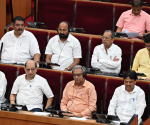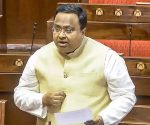Koraput dist still depends on fish imports to meet its demand | Bhubaneswar News

Koraput: Despite possessing abundant resources for pisciculture, Koraput district still depends on fish imports from neighbouring Andhra Pradesh to meet its demand. With an annual demand of over 17 metric tonnes (MT) of fish, Koraput produces 11.647 MT, creating a significant shortfall.
Currently, pisciculture is practised across 3,985 tank ponds covering 3,073 hectares, 13 minor irrigation projects spanning 271 hectares, and six reservoirs occupying 8,062 hectares, involving the efforts of 4,250 farmers and 2,060 fishermen.
“It’s unfortunate that despite having a dedicated department for over six decades and plenty of water bodies, the district has failed to become self-sufficient in fish production,” said Sukant Sahu, a local activist. “Urban markets in Jeypore, Koraput, Kotpad, Sunabeda and Semiliguda still rely on fish imports from Andhra Pradesh,” he added.
While some alleged that authorities have failed to effectively bring various govt schemes for pisciculture closer to farmers and encourage them to adopt it, officials asserted that regular awareness programmes are being conducted.
“Farmers are informed about govt schemes promoting pisciculture and the subsidies available. There has been a gradual increase in the number of farmers taking up fish farming,” said Bharat Bhusan Sahu, district fisheries officer.
Officials also pointed out that Koraput’s hilly topography poses challenges for widespread pisciculture development.
“Most fish farming activities are concentrated in Jeypore, Borigumma, Kotpad, Kundura and Boipariguda blocks. Additionally, the Kolab reservoir, one of the largest in the region, presents difficulty due to submerged stumps that hinder net-spreading for fish capture,” Sahu explained.
“We are hopeful that more farmers will take up pisciculture in the coming days, ultimately reducing dependency on imports,” the official added.
Currently, pisciculture is practised across 3,985 tank ponds covering 3,073 hectares, 13 minor irrigation projects spanning 271 hectares, and six reservoirs occupying 8,062 hectares, involving the efforts of 4,250 farmers and 2,060 fishermen.
“It’s unfortunate that despite having a dedicated department for over six decades and plenty of water bodies, the district has failed to become self-sufficient in fish production,” said Sukant Sahu, a local activist. “Urban markets in Jeypore, Koraput, Kotpad, Sunabeda and Semiliguda still rely on fish imports from Andhra Pradesh,” he added.
While some alleged that authorities have failed to effectively bring various govt schemes for pisciculture closer to farmers and encourage them to adopt it, officials asserted that regular awareness programmes are being conducted.
“Farmers are informed about govt schemes promoting pisciculture and the subsidies available. There has been a gradual increase in the number of farmers taking up fish farming,” said Bharat Bhusan Sahu, district fisheries officer.
Officials also pointed out that Koraput’s hilly topography poses challenges for widespread pisciculture development.
“Most fish farming activities are concentrated in Jeypore, Borigumma, Kotpad, Kundura and Boipariguda blocks. Additionally, the Kolab reservoir, one of the largest in the region, presents difficulty due to submerged stumps that hinder net-spreading for fish capture,” Sahu explained.
“We are hopeful that more farmers will take up pisciculture in the coming days, ultimately reducing dependency on imports,” the official added.
















